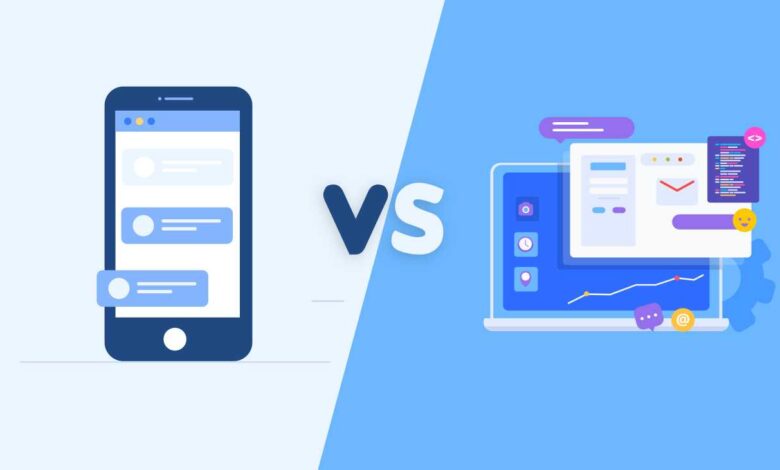Mobile App vs. Web App: What’s the Difference?

Mobile and web applications are among the key modes for promoting some business-centric software. Today, most companies utilize one of the options in their everyday work. Let’s imagine that you want some finance application for your company. In this case, either of the choices would be perfect. All that shall be different in the case is the complexity of the involved software. In this article, we’ll look at the difference between mobile and web apps. Then, we shall give you some advice on the topic. In the end, you’ll be able to pick proper high-quality web and mobile development services.
Mobile Apps vs. Web App: How Do They Compare?
The mobile and web applications feature somewhat different models of functioning. A mobile application is made for mobile platforms. It requires some mobile-specific programming frameworks and interaction with the available internal hardware. At the same time, a web application typically employs the tools aimed at the available PC web browsers. For example, you have to thoroughly think about the web engines used in Chrome within this platform. At the same time, the hardware you can orient yourself shall include the traditional personal computer/laptop frameworks. The former platform has mobility. The latter has more power. Thus, the choice depends on the complexity of the features you want.
Mobile App vs. Web App: Which One Should You Choose?
When it comes to choices between mobile and web applications, the choice depends on what you want. Let’s take a look at different use cases for the software.
So, when should you use mobile applications? Here are some ideas:
- You want your application to be portable: if, for example, you produce some maps, it’s crucial to have an opportunity to use them at any point;
- Your applications are relatively light: chats of various kinds, for example, are very convenient to use on small devices and need little to no resources. In this light, producing your product for mobile platforms is a great idea;
- You want to reach a wider audience: mobile phones are now the dominant types of computing hardware. Even in the most impoverished regions, more and more people have smartphones. Thus, your application should be able to reach a maximal number of people today.
And what about web applications? Some potent uses exist too:
- You seek to create an application that uses many resources: imagine that you want to create a platform for mathematical calculations. Something complex is very difficult to realize on a mobile platform. A web app that can use the resources of a PC works much better in this case. Yes, some web apps can be mobile-centric too. Still, a web approach gives you access to the most superior resources in terms of hardware.
- You want to use complex interfaces: PCs were created to facilitate the ability to work efficiently. For example, printing is usually efficient solely on a PC platform due to its strong keyboard capabilities. Thus, if you have something complex in mind, choosing a web app is simply a better solution.
Conclusion
Overall, the presented information means that both web and mobile applications are potent ideas. On the one hand, web applications give you a chance to create something complex and convenient. Their browser-based nature also allows spreading an application across multiple operating systems (Windows, Linux, and macOS). On the other hand, while usually bound to Android or iOS platforms, mobile applications are very convenient for small applications that need to be portable. Therefore, your choice in this case simply depends on your needs. Our final recommendation is to consult professionals: they can give you lots of relevant advice.




